But first, a diatribe…
I finally get that there’s a perception that the only writers of gay fiction who are getting any attention or making any money are writers of romantic novels. Since everyone I know who writes romantic fiction has yet to tell me that they have ginormous royalty checks rolling in–neither do we–or have gotten a lot of gay–much less mainstream–press, I wish I could vanquish the hostility this perception has created.
I’ve sensed the anger in magazine editorials, on writers’ discussion boards, and in reviews. I suspect that the breakdown of what people read is no different among gay-themed fiction and nonfiction than straight-themed. Literary fiction has rarely sold well. Readers of contemporary fiction are always looking for the next new trend. Niche titles including romance, mystery, thriller, glitz, erotica, Western, spirituality, etc.–are probably bought in the same percentages no matter what arbitrary characteristic is placed on them (gay, lesbian, black, whatever).
A good story is a good story. It will find an audience, if it gets published and marketed. Frustrated writers should turn their wrath upon a non-reading public or a bottom-line-driven industry instead of other writers. That was among the points Christopher Rice made in an Advocate article, in which he answered the anguished, “Why can’t we find anything in popular culture that gives us a story of gay people that doesn’t end in some kind of tragedy?” with an admonishment to read more books, which cover the full spectrum of gay experience–the comic to the tragic and everything between.
My opinion, for what it’s worth…
In the first wonderful wave of gay novels in the 1970s, the lives most often portrayed were those of urban, gay-ghettoized men. That was FANTASTIC! The silence was broken, and gay lives were being recorded in fiction. Some great writers were published, and they gave us characters who refused to be closeted, who celebrated their existence in every way imaginable. And no matter what the right-wingers and religious extremists say, those men (in real life and in books) did absolutely NOTHING that wasn’t being done by straight people. It was only shocking because it was finally being done openly and unapologetically.
Then came AIDS, and novels rightfully presented us with hard truths that the media and our government would not. Voices were given to one of the most marginalized populations–the ill and dying–that I will ever know of in my lifetime. Ultimately, we lost so many of those brilliant writers, but not before they, and their successors, made a record of this agonizing time for posterity. It was SIMPLE CHANCE–and temporary–that the population affected IN THIS COUNTRY was gay. But I wonder if anyone else could have articulated the devastation with such painful beauty or cared for the fallen with such compassion.
But who was missing from gay fiction? People who didn’t live in urban areas. People who didn’t have AIDS. People who lived in ordinary towns among general populations and worried about their jobs and their kids and their acid reflux and their significant others. I think a lot of so-called beach reads and love stories came into being because people wanted to read about regular people who fall in love and argue with their parents and hate their bosses. They weren’t looking for anything profound, just something to enjoy that they could relate to a little, that might amuse them and provide the hope that a happy ending offers.
Now you can write a love story or a detective story or a literary story or a memoir or a suspense story or a Western or erotica with GLBT characters, and that’s a good thing. But you can’t make people read, and you’re competing with the fast gratification of technology (computers and games) and other media like movies and TV.
YOU ARE NOT COMPETING WITH OTHER WRITERS, whether their work is like yours or different. So stop bitching about and resenting one another. This Aries has spoken.
Meanwhile, here are some of the fantastic people who created an environment of support and encouragement at Saints and Sinners. MARVELOUS PEOPLE, all of them, and I’m so glad to have met them and listened to them and learned from them. They gave off such creative and good energy.
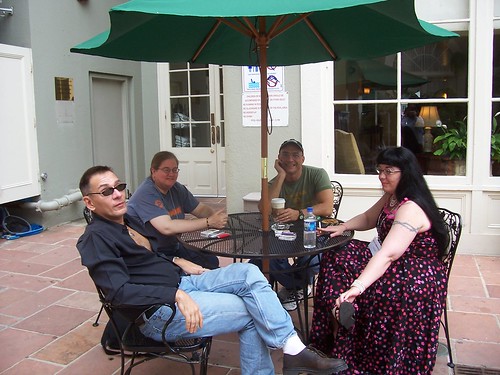
Fabulous S&S organizer Paul Willis with writers Carol Rosenfeld, Greg Herren, and Amie Evans. I wish I’d had more time with them all.

Tim with the mesmerizing Robert Taylor, who actually brought me to tears when I attended one of his panels. He knew it, too, because afterward when I tried to express my feelings, he hugged me three times. I wanted to go home with him.
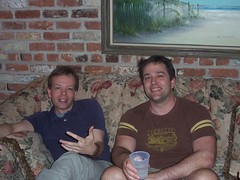
On Greg and Paul’s couch, Martin Hyatt and Dan Boyle. Adorable men with brains and endearing personalities.
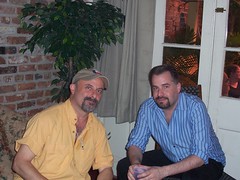
Author Ron Jackson Suresha with Alyson editor Joe Pittman. I hope I didn’t bother them, ’cause they seemed to be talking about something important.
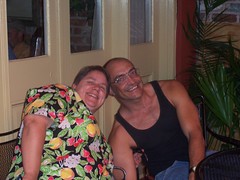
Bywater Books publisher Kelly Smith with author Greg Herren. Kelly and her business partner, author Marianne K. Martin, are fantastic people.
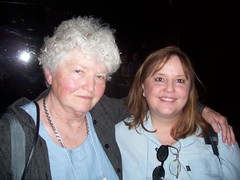
The legendary Patricia Nell Warren with me. What an honor to meet her.
There were so many other people that I enjoyed meeting and talking to or listening to, but of whom I didn’t get photos, including Poppy Z. Brite, Caro Soles, Steven Saylor, Anthony Bidulka, Toni Amato, Radclyffe, David Rosen, Scott and Scott, Carol Seajay, Shelley Thrasher, Emanuel Xavier–I know I’m leaving out people. And there were more people I wanted to meet and talk to, but there just wasn’t enough time.
Of course, I’ve already provided a photo in a previous entry of the incomparable Trebor Healey–he and Tim met, fell in love (platonically?!?!), broke up, and reminisced about their relationship over the weekend. And I earlier posted photos of the amazing Jim Gladstone and the brilliant Kelly McQuain.
There were also people who weren’t panelists, including Marcia Finical, Karissa Kary, and the man with the kindest face in the world, Mark Harris, who knows how to rescue a damsel in distress and who I’m sure I’ll be meeting again (and I hope my mail isn’t going to his spam folder…).
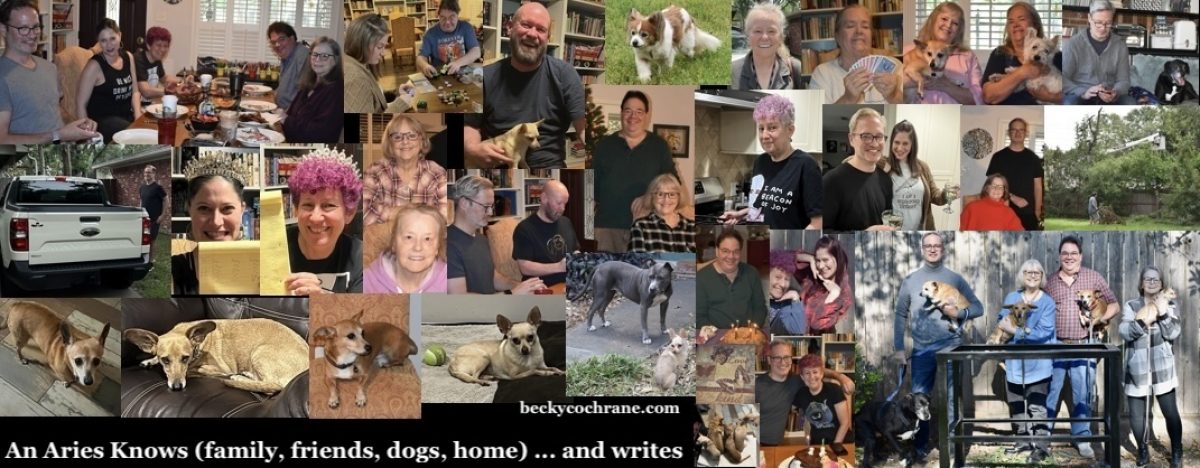
It seems to me that writers should be helping each other, congratulating each other, and enjoying each other. I think you just squished my little bubble image of authors being this sunshiney happy land of comfort and supportiveness.
*pop*
Then again, why should it be any different than any other sector..?
And I keep telling you, and and that you must stop mentioning names. I keep looking up those names, and my Mastercard is soon fit to melt. Stop it. Stop it, young lady!
Of course, many writers are helping, congratulating, and enjoying each other. Greg Herren is a great example, because he’s done so much for Tim and me personally, but also look at what he and Paul do for writers in a big way through Saints and Sinners.
Most of the writers I’ve met throughout my life have been supportive (and a lot of them gave me great advice), but since we are human, there will always be those who resent someone else’s perceived success.
I’m resentful of your perceived success, Becky. Curse you and your kind.
Oh, so you’re the one whose bile is sending me to the bathroom every 15 minutes. No, no, don’t worry; I can hold back my own hair.
That must be somebody else. I was only going for an unruly cowlick in your hair, not bile.